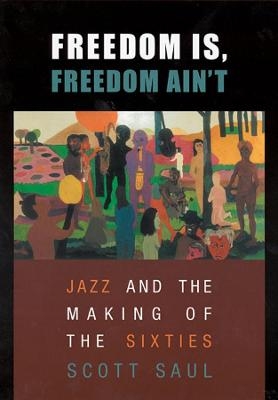
Freedom Is, Freedom Ain’t
Harvard University Press (Verlag)
978-0-674-01853-2 (ISBN)
In the long decade between the mid-1950s and the late ’60s, jazz was changing more than its sound. The age of Max Roach’s Freedom Now Suite, John Coltrane’s A Love Supreme, and Charles Mingus’s The Black Saint and the Sinner Lady was a time when jazz became both newly militant and newly seductive, its example powerfully shaping the social dramas of the Civil Rights movement, the Black Power movement, and the counterculture. Freedom Is, Freedom Ain’t is the first book to tell the broader story of this period in jazz—and American—history.
The story’s central figures are jazz musicians like Coltrane and Mingus, who rewrote the conventions governing improvisation and composition as they sought to infuse jazz with that gritty exuberance known as “soul.” Scott Saul describes how these and other jazz musicians of the period engaged in a complex cultural balancing act: utopian and skeptical, race-affirming and cosmopolitan, they tried to create an art that would make uplift into something forceful, undeniable in its conviction, and experimental in its search for new possibilities. Freedom Is, Freedom Ain’t considers these musicians and their allies as a cultural front of the Civil Rights movement, a constellation of artists and intellectuals whose ideas of freedom pushed against a Cold War consensus that stressed rational administration and collective security. Capturing the social resonance of the music’s marriage of discipline and play, the book conveys the artistic and historical significance of the jazz culture at the start, and the heart, of the Sixties.
Scott Saul is Professor of English at the University of California, Berkeley, and host of the books and arts podcast Chapter & Verse.
List of Illustrations Preface Introduction: Hard Bop and the Impulse to Freedom Part One: A New Intellectual Vernacular 1. Birth of the Cool: The Early Career of the Hipster 2. Radicalism by Another Name: The White Negro Meets the Black Negro Part Two: Redefining Youth Culture 3. Riot on a Summer's Day: White Youth and the Rise of the Jazz Festival 4. The Riot in Reverse: The Newport Rebels, Langston Hughes, and the Mockery of Freedom Part Three: The Sound of Struggle 5. Outrageous Freedom: Charles Mingus and the Invention of the Jazz Workshop 6. "This Freedom's Slave Cries": Listening to the Jazz Workshop Part Four: Freedom's Saint 7. The Serious Side of Hard Bop: John Coltrane's Early Dramas of Deliverance 8. Loving A Love Supreme: Coltrane, Malcolm, and the Revolution of the Psyche Part Five: In and Out of the Whirlwind 9. "Love, Like Jazz, Is a Four Letter Word": Jazz and the Counterculture 10. The Road to "Soul Power": The Many Ends of Hard Bop Notes Acknowledgments Index
| Erscheint lt. Verlag | 30.12.2005 |
|---|---|
| Zusatzinfo | 12 halftones, 2 musical examples |
| Verlagsort | Cambridge, Mass |
| Sprache | englisch |
| Maße | 143 x 233 mm |
| Themenwelt | Kunst / Musik / Theater ► Musik ► Jazz / Blues |
| Sozialwissenschaften | |
| ISBN-10 | 0-674-01853-2 / 0674018532 |
| ISBN-13 | 978-0-674-01853-2 / 9780674018532 |
| Zustand | Neuware |
| Haben Sie eine Frage zum Produkt? |
aus dem Bereich


